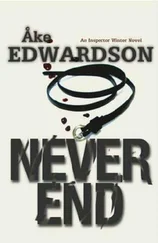“Go over,” said Winter.
“I’ve been about to,” said Ringmar. “But now he’s coming home.”
“Is he?”
“Just a break. For a few weeks.”
Winter left early and walked by way of Saluhallen, the indoor market. He bought a pound of farmer cheese from Brittany and two Estonian flatbreads; that was all.
A bar on Södra Larmgatan glowed invitingly. It was new and he didn’t see a name. He went in and ordered a beer from the tap and sat at a window table. A man was sitting alone at the bar. The bartender was preparing glasses and olives and plates and bottles and doing all the other pleasant things bartenders occupy themselves with during the hour of blue twilight before guests arrive. Winter lit a Corps. This was the best time in a bar, as good as empty, a sense of anticipation before the evening, an unidentifiable serene sound. He looked around. The twenty-first century had introduced new trends in bar design. It was no longer mini-mini-minimalistic, the kind of design that gave the impression that you were sitting in a deserted hangar.
There was leather and wood and a warm light here. No bare lightbulbs hanging from the ceiling.
He could have his new office here. Here, by the window. During interrogations you could hold the candle a little closer to the person being interrogated in order to see the play of his eyes. The video camera could stand on the windowsill.
His colleagues from the jail could wait at the bar.
He took his phone out of his inner jacket pocket and called home.
“I’m on my way,” he said.
The bartender dropped a glass on the floor. The floor was made of stone. The man at the bar yelled, “Cheers!” and raised his glass.
“The streetcar is lively, I hear,” said Angela.
“Ha ha.”
“Be good and come home now,” said Angela.
Winter looked around.
“What do you say about a little drink before dinner?” he said.
“It depends on the place,” she said.
“It’s new and I’m the only one here,” he said, watching as the man at the bar climbed off his stool and made some sort of bow toward the bartender and left the bar with the exaggeratedly decisive movements of someone who is half drunk.
“I have to ask Elsa,” said Angela.
“Do you have to ask her permission for everything?”
“Ha ha ha.”
“I promise not to smoke,” said Winter.
“She says it’s okay if I come, but she wants to invite herself along to keep an eye on us.”
“Södra Larmgatan, right across from Saluhallen.”
He hung up and drank his beer. People outside were on their way somewhere. The sun was on its way to the Southern Hemisphere. The sky was colored orange, which meant that the sun would come back tomorrow. The light outside was blue because the hour was blue. A long evening awaited. He thought he would let it take its course; he wouldn’t interfere.
The phone rang again. He didn’t recognize the number on the screen. He debated letting it ring, but if he did it would be the first time.
There’s a first time for everything.
He didn’t answer.
He felt a sensation in his body when the ringing stopped.
Something has happened.
He lifted his hand toward the bartender.
This calls for a celebration.
Angela came with Elsa, who immediately ordered a drink with bubbles. Angela ordered a dry martini. Winter ordered a Longmorn. Angela had a dark circle under one eye, which was a sign that she was tired. Never more than one circle, and it was never there for more than a few short hours, before a new day. Soon it would be a new day.
“Cheers, and hi,” said Elsa.
Winter raised his glass. He looked into Angela’s eyes. What kind of habits are we teaching our daughter? How will it be when we’re not there keeping an eye on her? What will happen with the bubbles?
“Is it good, Elsa?” asked Angela.
“It tickles my nooose,” said Elsa.
Just then, Winter felt a sting in his nose and in the next second he sneezed.
“Bless you!” shrieked Elsa.
“Thanks, sweetie.”
“Does your nose tickle too, Papa?”
“Yes. Just like yours.”
“But I didn’t sneeze!”
“I did it for both of us.”
“Ha ha!”
“If you two keep this up, I’ll sneeze too,” said Angela.
“How can this be explained from a purely medical perspective?” said Winter.
“What?”
“Well, you’re a doctor. How do you explain why you have a sneezing reflex when other people talk about sneezing?”
“I don’t think the research has come very far in that area,” said Angela. “And I really don’t know which branch it would be done in.”
“Medicine,” said Winter. “Ear nose throat.”
“No.”
“Physiology.”
“No.”
“Sneeziology.”
“No.”
“Nosiness,” said Elsa.
Her parents looked at her.
I am the father of a genius, thought Winter.
“Where did you get that from, Elsa?” asked Angela.
“You had to say something with ‘nose,’ right? My day-care teacher told us the story of the nosy boy.”
“So you didn’t mean that Papa and I were talking about knowing about noses?”
Winter saw that Elsa didn’t understand the question, and he relaxed.
“Did your teacher tell you what nosiness means?” he asked.
“I forget.”
“What does it actually mean?” asked Angela, looking at him.
“That you take too many liberties,” said Winter.
“You’re taking too many liberties here,” said the man who said that his name was Sigge Lindsten and that he was Anette Lindsten’s father. “Even for the police.”
Aneta Djanali didn’t answer. She still felt dizzy. If there had been anything to take hold of, she would have grabbed it.
“Are you okay?” asked the man.
“Could I have a glass of water?”
The man seemed to make a decision. He no longer looked unsympathetic. Maybe he never had.
“Come in,” he said.
She took off her shoes in the hall. She could smell some plant, a scent she recognized but couldn’t place.
When she followed the man to the kitchen she remembered that she had smelled the same scent in the apartment that two men were in the process of emptying in front of her. Crazy. Just crazy.
She felt the dizziness again.
“Please sit down,” said the man. He filled a glass with water. “Here,” he said.
She drank. She saw the wind move in a tree outside, maybe a maple. The wind had increased the last few days, like a growling promise of autumn. She didn’t look forward to it.
She suddenly spun again. Am I becoming seriously ill? she thought.
“Now, what’s this about Anette?” said Sigge Lindsten.
That’s my question, she thought.
“Is Anette home?” she asked.
“Not at the moment,” said the man.
She looked around.
“Is your wife home?”
“She’s not home at the moment either,” he said.
“Could I see some identification?” asked Aneta.
“I beg your pardon?”
“Identification. I’m sorry, but this is all a bit confusing, and I will explain soon. But first I have to be certain that you’re the-”
“Good Lord,” interrupted the man, “I’ll get my wallet. This should be interesting to hear.”
He went out into the hall and came back with his wallet and held it out, and she saw his driver’s license in a plastic sleeve. It was in the name of a Sigvard Lindsten, and the relatively recent photograph showed the man who stood before her.
“Thanks,” she said.
He closed his wallet.
“Have you heard of Hans Forsblad?” she asked.
“Isn’t it my turn to ask some questions?” said Lindsten.
Читать дальше












